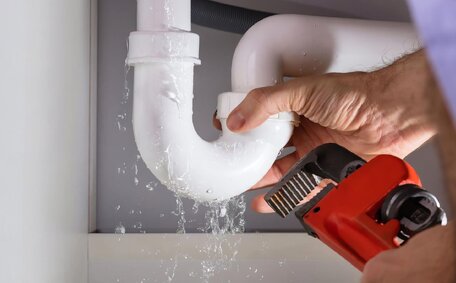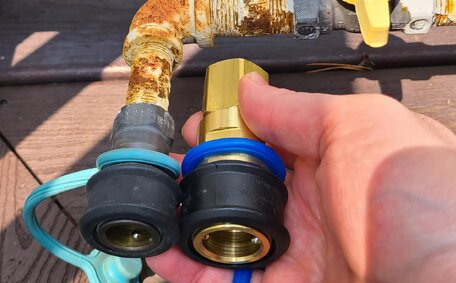Introduction to Hot Water System Maintenance
Regular servicing and maintenance are crucial to ensure the efficiency, longevity, and safety of your hot water system. These systems, like any household appliance, need routine checks to operate at their best.
This guide provides detailed steps to maintain your hot water system effectively.
We’ll cover key areas to inspect for various types of hot water systems to promote efficient hot water usage - monitoring temperature and pressure, and checking valves and pipes for leaks. You’ll discover the varied maintenance requirements for different hot water systems such as solar, heat pump, gas, and electric.
The article highlights the essential role of preventative maintenance for your water heater. Proper maintenance optimises water and energy usage, leading to savings on utility bills.
You’ll learn how to protect your water heater with regular maintenance and ensure cost-efficiency for its upkeep. Exploring routine inspections can help maintain your hot water system’s performance year-round.
Understanding Hot Water Systems and Their Key Components
There are several main types of water heating systems used in homes - electric hot water systems, gas hot water, solar, and heat pump. Each system has unique components that collaborate to supply hot water efficiently via heating and delivery.
Electric hot water system uses one or more electric heating elements submerged in a storage tank to heat the water. The main components are the hot water tank, heating elements, thermostat to control temperature, pressure relief valve, and pipes to supply hot water.
Gas hot water system utilises a gas burner that heats a storage tank. Key parts include the storage tank, gas control valve and burner, flue pipe to vent exhaust, thermostat, pressure relief valve, and water pipes.
Solar hot water systems use solar thermal collectors to harness heat from the sun. This technology enables continuous flow of heated fluid in the collector, which then transfers heat into the water storage tank. Key components are the solar collectors, storage tank, electric booster heating element, pumps, and controllers.
Heat pump hot water systems work by extracting heat from surrounding air to warm refrigerant gas in a heat pump unit. This heat energy is then utilised by a water tank to heat water efficiently. Key parts are the heat pump unit, storage tank, thermostats, pressure valves, and pumps.
Understanding your system’s components and operations is key to effective maintenance. It also assists in diagnosing issues to determine if professional repairs are needed.
The Importance of Regular Maintenance
Regular preventive maintenance for your hot water system is crucial for multiple reasons. Catching minor problems early on through routine checks can help preserve the lifespan of your hot water system, avoiding inconvenient outages and costly repairs down the track.
Firstly, it helps prevent unexpected and costly breakdowns. Well-maintained units are more reliable, with increased lifespan and fewer leaks, faults and signs of wear.
Consistent maintenance can significantly extend your hot water system’s lifespan. The lifespan hot water units are subjected to annual servicing and component replacements as required can outlast units left unchecked for over a decade.
There are energy efficiency and cost benefits too. Well-maintained systems require less power for heating, thus cutting electricity or gas consumption. You save on energy bills while also reducing your environmental footprint.
Routine maintenance upholds safety standards and also improves the cost-efficiency of your home’s hot water system. Regular checks verify that components such as tempering valves, pressure relief valves, and the sacrificial anode are in good condition.
So whether optimising functionality, efficiency, costs, sustainability, or safety - diligent hot water system maintenance pays dividends across the board.
Recommended Maintenance Tasks and Schedules
To ensure optimal performance of your home’s hot water system, perform key maintenance tasks at least every five years.
Every 6 months:
- Inspect all water pipes, connections, and TPR valves for signs of leakage or malfunction
- Check the TPR valve by lifting the lever - a dysfunctional valve can cause water to not flow as expected
- For solar systems, ensure the glycol fluid levels in the solar collectors are adequate
Annually:
- Engage a professional to flush the tank with the drain valve, removing mineral sediment buildup.
- Test and record water temperature - should be 50-60°C
- Examine the anode rod, which should be replaced if eroded beyond 60%, typically every few years.
- Inspect the tempering valve to ensure safe hot water delivery
Every 3 years:
- Replace valves and components in your gas storage hot water systems
- Check electric heating elements and thermostats
- Inspect heat pump unit coils and pumps
Consider upgrading to a new water heater every 8-12 years to maintain optimal efficiency and longevity. Keep maintenance logs to ensure the hot water your appliances rely on comes from a well-serviced system.
Alongside basic DIY upkeep, annual professional servicing is key to maintaining your system’s safety and efficiency.
Detecting Issues and Signs of Needed Repairs
Early detection of issues can prevent more significant problems in the future. Be vigilant for any signs that your hot water system needs maintenance or repairs:
- Irregular temperatures of the water your system produces - If temperatures fluctuate or are too hot/cold, the thermostat or heating elements may be faulty.
- Water quality issues - Rusty, brown, or muddy water indicates corroded pipes or a failing tank lining.
- Low water pressure may indicate sediment buildup, leaks, or pressure valve issues.
- Strange noises - Clunking, banging, or rumbling noises can indicate problems with valves or heating elements.
- Wet patches or water leak - Leaks around the tank, valves, or pipe joints often require resealing or replacement.
- Fault error codes - Many systems will flash numerical fault codes on digital displays when potential issues are detected.
We recommend seeking professional servicing if you notice any of the above issues. Left unchecked, problems can worsen over time leading to system failure, costly parts replacements, and even water damage if significant leaks eventuate.
Annual servicing can identify and address minor issues before they lead to breakdowns. For example, Inspections can uncover issues like corroded connections that require resealing well before leaks develop.
Don’t take chances with your hot water system - consistent maintenance safeguards efficiency and prevents avoidable, expensive repairs.
Considerations for DIY vs Professional Maintenance
When it comes to hot water system maintenance, homeowners have a choice between DIY servicing or hiring a professional plumber. Both approaches offer distinct advantages.
Basic tasks such as leak inspections, valve testing, temperature monitoring, and sediment flushing are manageable for the DIY homeowner. DIY is often cheaper too. You just cover the cost of parts.
However, some aspects of gas water service require qualified expertise. Checking electric heating elements, testing thermostats, inspecting solar panels, and evaluating system efficiency are best left to licenced plumbers with technical know-how.
Licensed plumbers also have the tools, equipment, and materials for comprehensive servicing. Tasks like replacing anodes, fixing leaks, or adjusting thermostats are difficult without proper gear. Calling in a tradesman also safeguards warranty coverage should faults arise down the track.
Gladesville Plumbing’s qualified technicians provide hot water system maintenance that meets top industry standards. For complex repairs, you can rely on our 30+ years of plumbing expertise to get your system running optimally again.
Though DIY maintenance is valuable, regularly servicing your hot water system with professionals ensures optimal efficiency, safety, and longevity. Our preventative servicing, a popular choice among homeowners, keeps small issues from escalating into big problems over time. We help your hot water system last longer while spending less on emergency repairs and expensive part replacements.
Contact Gladesville Plumbing for dependable and cost-effective hot water system maintenance in Gladesville and the Central Coast.
Optimizing Efficiency and Extending the Lifespan
With regular preventative maintenance, you can supply hot optimised water system’s efficiency and prolong its lifespan significantly.
Simple adjustments, such as insulating your water pipes and lowering thermostat temperatures, can last up to having a significant impact on saving energy over time. We recommend keeping your thermostat between 50-60°C to prevent scalding and heat loss.
Flushing hard water sediment buildup annually also enhances the efficiency a hot water unit can achieve by allowing superior heat transfer and water flow.
Replacing worn parts as needed, rather than letting them fail, is key to longevity. Things like relief valves, anode rods and heating elements degrade gradually. Identifying and replacing components suitable for the size your system through routine maintenance means fewer breakdowns and longer uninterrupted operation.
Locating your system close to water draw points shortens pipe runs, reducing wasteful heat loss further. Clustering fixtures that use hot water together allows for a more compact and efficient setup.
With diligent preventative maintenance, your quality hot water system can last 15-20 years. Doing maintenance yourself using our guide saves on labour costs without compromising safety or function.
For complex part replacements or efficiency optimising advice, email Gladesville Plumbing to arrange an inspection. Our licenced technicians inspect your system to boost efficiency, longevity and safety.
Special Considerations for Different System Types
The maintenance needs of hot water systems can vary slightly depending on the type system in use.
Electric Systems: Due to higher sediment buildup, flushing the storage tanks annually is especially important for electric systems. Check heating elements for corrosion and mineral deposits which can reduce efficiency.
Gas Systems: Regular inspections are crucial for components like the gas valve, thermostat, burner chamber, flue, and oxygen depletion sensor in gas systems. Have professional servicing to detect and rectify gas leaks immediately.
Solar Systems: Check all connections between collectors and the storage tank for leaks annually. Inspect the glycol fluid piping for corrosion. Ensure solar collectors remain dust and debris free for maximum solar absorption.
Heat Pump Systems: Yearly inspection of the heat pump unit’s heat exchanger is required, examining components like fan motors, flow valves, condenser coils and refrigerant levels. Ensure unobstructed outdoor airflow around the heat pump unit.
While general maintenance procedures like leak checks and anode rod inspections apply universally, noting differences as outlined above optimises safety, efficiency and longevity across all hot water system types.
For professional assistance tailoring a maintenance plan for your distinct water unit, our licensed plumber at Gladesville Plumbing can advise on maximising functionality and lifespan during annual servicing.
Safety Issues and Precautions
Maintaining proper safety precautions is crucial when servicing hot water systems. Always switch off the power supply and turn off the gas before starting maintenance to prevent electric shocks or gas leaks.
Allow the system to cool entirely before working to avoid burns. Wear protective equipment like gloves and eye protection when handling components. Take care handling electric parts even with the power disabled.
Be cautious when releasing pressure via the relief valve, as hot water may eject forcefully. Check it discharges safely away from areas people occupy.
Be attentive checking for gas leaks - do not use open flames, rely on approved leak detection spray or electronic detectors for accuracy. If a gas leak is suspected, turn off the gas supply immediately and call a professional.
With complex tasks like adjusting thermostats, replacing heating elements or anode rods, consider consulting a licenced plumber to ensure work complies with regulations.
By following essential safety measures and seeking expert assistance when unsure, you can maintain your hot water system confidently and avoid potential hazards.






